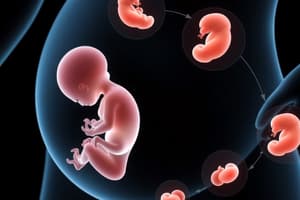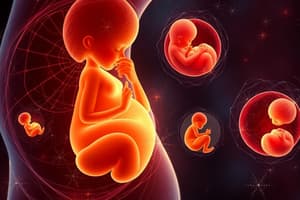Podcast
Questions and Answers
What is defined as all tissue products of conception, including the embryo and fetal membranes?
What is defined as all tissue products of conception, including the embryo and fetal membranes?
- Blastomere
- Morula
- Zygote
- Conceptus (correct)
Which stage of human development occurs from the eighth week until delivery?
Which stage of human development occurs from the eighth week until delivery?
- Pre-embryonic stage
- Fetal stage (correct)
- Embryonic stage
- Zygotic stage
At what gestational week does organogenesis become complete in fetal development?
At what gestational week does organogenesis become complete in fetal development?
- 8 weeks (correct)
- 4 weeks
- 12 weeks
- 16 weeks
What type of transport includes amino acids and calcium moving across the placenta?
What type of transport includes amino acids and calcium moving across the placenta?
What is the first sign of fetal movement that a multigravida mother is likely to perceive?
What is the first sign of fetal movement that a multigravida mother is likely to perceive?
Which physiological change is commonly observed in the cardiovascular system during pregnancy?
Which physiological change is commonly observed in the cardiovascular system during pregnancy?
At what week are fetal heart tones typically identifiable using Doppler technology?
At what week are fetal heart tones typically identifiable using Doppler technology?
What is the total allowable weight gain during an entire pregnancy for a woman with a normal weight prior to pregnancy?
What is the total allowable weight gain during an entire pregnancy for a woman with a normal weight prior to pregnancy?
What substance can be transported across the placenta via simple diffusion?
What substance can be transported across the placenta via simple diffusion?
Which week of pregnancy is characterized by the appearance of vernix caseosa and lanugo?
Which week of pregnancy is characterized by the appearance of vernix caseosa and lanugo?
What is a common gastrointestinal change experienced during early pregnancy?
What is a common gastrointestinal change experienced during early pregnancy?
What is one major concern related to placental surface area during pregnancy?
What is one major concern related to placental surface area during pregnancy?
Which hormone's activity is notably increased by the addition of the placenta during pregnancy?
Which hormone's activity is notably increased by the addition of the placenta during pregnancy?
What is the approximate weight of the fetus during the specified timeframe?
What is the approximate weight of the fetus during the specified timeframe?
Which sign is indicated by the bluish discoloration of the cervix, vagina, and labia?
Which sign is indicated by the bluish discoloration of the cervix, vagina, and labia?
What condition is characterized by the softening of the lower segment of the uterus?
What condition is characterized by the softening of the lower segment of the uterus?
What is the function of the operculum during pregnancy?
What is the function of the operculum during pregnancy?
How much does the placenta typically weigh?
How much does the placenta typically weigh?
Which of the following changes occurs in the breasts due to increased estrogen during pregnancy?
Which of the following changes occurs in the breasts due to increased estrogen during pregnancy?
What is the weight range of maternal stores during pregnancy?
What is the weight range of maternal stores during pregnancy?
What does quickening refer to in the context of pregnancy?
What does quickening refer to in the context of pregnancy?
Which of these changes indicates a shift in pH from normally acidic to alkaline in pregnancy?
Which of these changes indicates a shift in pH from normally acidic to alkaline in pregnancy?
What is the total weight of significant changes that occur in the body during pregnancy?
What is the total weight of significant changes that occur in the body during pregnancy?
Which condition represents an increased amount of vaginal discharge during pregnancy?
Which condition represents an increased amount of vaginal discharge during pregnancy?
Which of the following is NOT a characteristic of Lordosis in pregnancy?
Which of the following is NOT a characteristic of Lordosis in pregnancy?
What is melasma also known as during pregnancy?
What is melasma also known as during pregnancy?
How does the uterus shape change during pregnancy?
How does the uterus shape change during pregnancy?
What anatomical change occurs to the sweat glands during pregnancy?
What anatomical change occurs to the sweat glands during pregnancy?
Flashcards are hidden until you start studying
Study Notes
Fetal Development Overview
- Conceptus refers to all tissue products from conception, including the embryo and fetal membranes.
- Pregnancy averages 40 weeks (280 days) from the last menstrual period to birth.
- Human development consists of three stages:
- Pre-embryonic (first 14 days)
- Embryonic (15 days to 8 weeks)
- Fetal (8 weeks to delivery)
Definitions of Key Terms
- Zygote: The fertilized ovum.
- Blastomere: Daughter cells from the mitotic division of the zygote.
- Morula: A solid ball of cells formed by 16 or more blastomeres.
- Blastocyst: Stage of development where the morula forms a fluid cavity in the uterus.
- Embryo: The developing organism from 3 to 7 weeks post-fertilization.
- Fetus: The developing organism from the 8th week until birth.
Fetal Circulation and Maternal Transfer
- Substances crossing the placenta include:
- Simple Diffusion: Water, oxygen, carbon dioxide, electrolytes, certain drugs.
- Facilitated Transport: Glucose, galactose, some oxygen.
- Active Transport: Amino acids, calcium, iron, iodine, water-soluble vitamins.
Fetal Development Stages
- First Trimester*
- 4 weeks: Fetal heart begins to beat.
- 8 weeks: Organogenesis (organ formation) is complete; disproportionate head size.
- 12 weeks: The embryo is termed a fetus; fetal heart tones can be detected via Doppler.
- Second Trimester*
- 16 weeks: Quickening experienced (fetal movement felt by mothers); placenta fully formed.
- 20 weeks: Vernix caseosa and lanugo appear along with fetal movements.
- 24 weeks: Lung surfactant production begins.
- Third Trimester*
- 28 weeks: Fetus can hear sounds; high survival rate.
- 32 weeks: Lanugo diminishes; lungs mature.
- 36 weeks: Considerable lung development and readiness for delivery.
- 40 weeks: Full-term pregnancy; little lanugo, presence of vernix caseosa.
Pregnancy Symptoms and Evidence
- Presumptive Signs:*
- Nausea, changes in urination, fatigue, breast tenderness.
- Probable Signs:*
- Abdominal enlargement, uterine changes, Braxton Hicks contractions.
- Positive Signs:*
- Detection of fetal heart tones, ultrasound confirmation of fetus.
Maternal Systemic Changes
- Cardiovascular: Increased heart rate (80-100 bpm), potential anemia.
- Gastrointestinal: Variations like morning sickness, constipation, and heartburn.
- Respiratory: Increased shortness of breath due to restricted lung capacity.
- Urinary: Frequent urination and potential glucose presence in urine.
Weight Changes During Pregnancy
- 1st trimester: Average weight gain of 1.5-3 lbs.
- 2nd and 3rd trimesters: 10-11 lbs per trimester, aiming for a total gain of 20-25 lbs.
- Weight Distribution:
- Fetus: 3400 g (7.5 lbs)
- Placenta: 450 g (1 lb)
- Amniotic fluid: 900 g (2 lbs)
- Uterus: 1100 g (2.5 lbs)
- Breasts: 1400 g (3 lbs)
- Blood volume: 1800 g (4 lbs)
- Maternal stores: 1800-3600 g (4 to 8 lbs)
Local Changes in Reproductive Organs
- Uterus: Increased weight, softness, and mucus plug formation.
- Vagina: Chadwick’s sign indicating increased blood flow and leukorrhea.
- Breasts: Growth, fullness, and colostrum production by the 4th month.
- Skin: Changes like linea nigra and melasma from hormonal fluctuations.
Key Signs of Pregnancy
- Chadwick’s Sign: Bluish discoloration of cervix, vagina, and labia.
- Goodell’s Sign: Softening of the cervix due to vascularization.
- Hegar's Sign: Softening of the lower uterine segment.
- Quickening: Initial fetal movements felt by the mother.
- Ballottement: A bouncing effect during internal examination reflecting fetal movement.
Studying That Suits You
Use AI to generate personalized quizzes and flashcards to suit your learning preferences.




